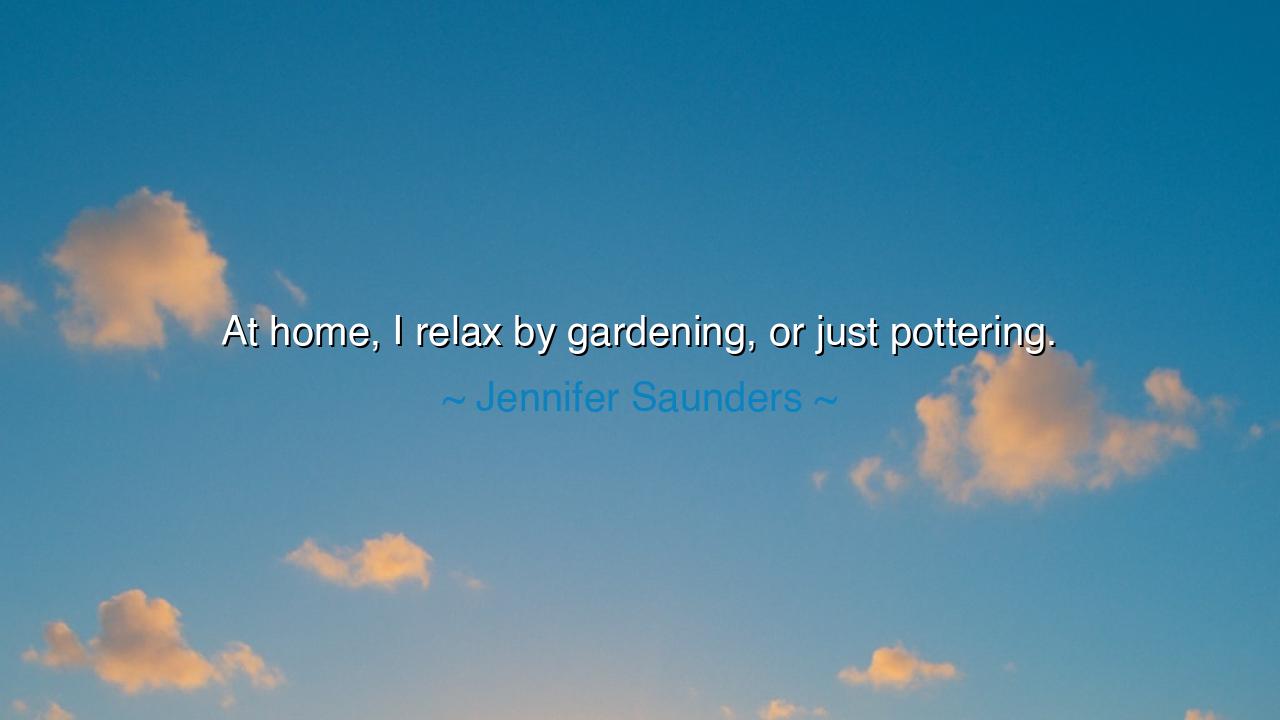
At home, I relax by gardening, or just pottering.






The words “At home, I relax by gardening, or just pottering” were spoken by Jennifer Saunders, the celebrated British actress and comedian whose humor has brought laughter to millions. Yet in this simple confession, she reveals something far deeper than a pastime — she unveils a philosophy of peace and presence. Her statement carries the gentle wisdom that joy does not always roar or dazzle; sometimes, it whispers quietly in the ordinary acts of daily life. Gardening, pottering, resting — these are the unspoken rituals through which the spirit mends itself. Beneath the lightness of her words lies a profound truth known to the ancients: that stillness, simplicity, and small acts of creation restore the weary soul more deeply than grand achievements ever could.
When Saunders speaks of gardening, she speaks of communion with life itself. The soil, the leaf, the bloom — all obey the rhythm of time, not the urgency of man. In turning the soil and tending the flowers, she returns to that sacred pace. The garden does not demand perfection; it asks only attention. It rewards not speed but care. To garden is to listen to the quiet voice of the earth and to remember that creation itself began in a garden — the first home of peace and purpose. For Saunders, gardening becomes a form of meditation, a way to quiet the mind after the noise of performance, the applause, and the expectations of the world.
But her mention of “just pottering” is equally meaningful. To “potter” — to move without haste, to tinker, to tend small things without agenda — is an art almost forgotten in a world obsessed with progress and productivity. It is the art of being content in the moment. The potterer accomplishes nothing grand, yet everything necessary: the mind unwinds, the senses awaken, the heart settles. In pottering, one lets go of striving and rediscovers presence — the sacred awareness that each small act, however mundane, can be holy when done with mindfulness. It is the same spirit that filled the monks of old as they swept cloisters or tended herbs, finding God not in spectacle, but in stillness.
The ancients understood this truth well. The Roman philosopher Seneca once wrote that “to be idle well is an art.” He did not mean laziness, but the noble idleness of reflection and gentle work — the kind that renews rather than depletes. In a similar spirit, Leonardo da Vinci would step away from his great inventions and paintings to wander through nature, sketching leaves and studying water, calling these quiet interludes “the nourishment of the mind.” So too does Jennifer Saunders find, in her humble hours of gardening and pottering, a return to balance. She reminds us that rest is not the absence of movement, but the restoration of harmony between the inner and outer worlds.
There is also a quiet heroism in her words. In a culture that glorifies exhaustion and achievement, to claim peace as one’s own is a radical act. Saunders, who spent years in the intensity of the entertainment industry, understands that true joy cannot be performed — it must be cultivated. Her garden is her sanctuary, and her pottering, her prayer. It is there that laughter returns not as performance, but as the natural rhythm of the heart. In this, she joins a lineage of souls who discovered that simplicity is not emptiness, but fullness — a life lived slowly enough to notice its blessings.
Her reflection, though light in tone, carries a message of deep spiritual grounding. It teaches that peace is not found in distant retreats or dramatic transformations, but in the humble, repetitive acts of care and attention. The seed sown, the cup washed, the drawer tidied — these are the small deeds that stitch the soul together. The wise do not despise them; they revere them, for in such quiet labor the spirit finds its rhythm again. The act of “just pottering” becomes a form of living prayer, a hymn sung not with words, but with patience and care.
The lesson of Saunders’s quote is clear: do not chase peace — cultivate it where you stand. The simplest acts, done with attention and love, have the power to renew your heart. The garden, the home, the little tasks of life — these are sacred spaces waiting to restore you.
Practical actions: Each day, set aside time to engage in a gentle, purposeless activity — water a plant, rearrange a shelf, take a slow walk without destination. Resist the urge to measure its worth by productivity. Let your hands move while your thoughts rest. Let the smallness of the moment remind you of life’s quiet abundance. For as Jennifer Saunders reminds us, peace is not found by running faster, but by slowing down enough to notice the grace already growing around you.






AAdministratorAdministrator
Welcome, honored guests. Please leave a comment, we will respond soon